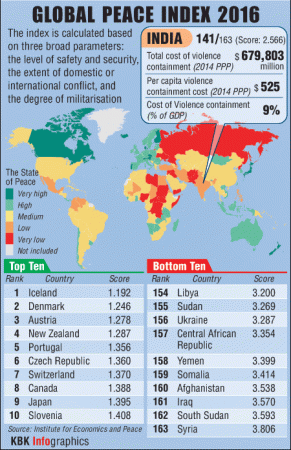
Violence in the world has increased in 2016, as reported by Reuters, citing Global Peace Index (GPI) 2016 report. Three important factors namely deaths from conflict, terrorist attacks and displacement of people have set new global records, in turn affecting peace, it added.
Incidentally, just by keeping away the mayhem happening in the Middle-East region, the world would turn into a peaceable place to live than it was last year, said Steve Killelea, whose institution publishes the index (GPI).
The world's most peaceful country to live in is the island nation of Iceland, while Denmark, Austria, New Zealand and Portugal are among the other top five peaceful countries. The least peaceful is Syria, South Sudan, Iraq, Afghanistan and Somalia in that order.
Killelea-founded Institute for Economics and Peace (IEP) uses 23 indicators to mark countries for their peacefulness. Incidents of violent crime, level of militarisation, weapon imports and other indicators are considered in preparing the GPI.
Syria alone saw 67,000 people killed in conflict out of 100,000 deaths worldwide in 2014. The number of displaced is estimated to be definitely over 60 million seen last year and breaching the record set during the World War II days.
Terrorist attacks too were limited to the five countries of Syria, Iraq, Nigeria, Afghanistan and Pakistan, noted the report.
IEP said the economic cost of violence was $137 trillion (more than the world GDP) and unfortunately, security alone qualifies as the sole solution to international community to fix the rot, highlighted the report.
"For me the most profound thing about the index is the ability to use it ... to better understand the qualities ... which create peaceful societies," Killelea said.
Necessary Evils
Other indicators that allude us to world peace, given their better scores over last year, are: funding for UN peacekeeping operations and cut in global military spending. The world saw a huge 10 percent cut in its global military expenditure over the last three years, while UN Peacekeeping operations received record funding.
However, Killelea said the money spent on peace building and peacekeeping are proportionately smaller compared to the economic impact of violence. It represents "just 2 percent of global losses from armed conflict," she added.
Indian Sub-continent
With 141st rank on the Global Peace Index, India is considered a country with low state of peace. India's neighbours Nepal, Bangladesh, Sri Lanka were categorised under countries with medium state of peace with ranks of 78, 83 and 97th, respectively. Bhutan, India's neighbour to the north-east, was ranked 13th, calling it as a nation with very high state of peace. Pakistan and Afghanistan ranked 153rd and 160th as countries with very low state of peace.
China's state of peace was also ranked under the low category with 120th rank.

















